THE WESTMINSTER CATECHISM
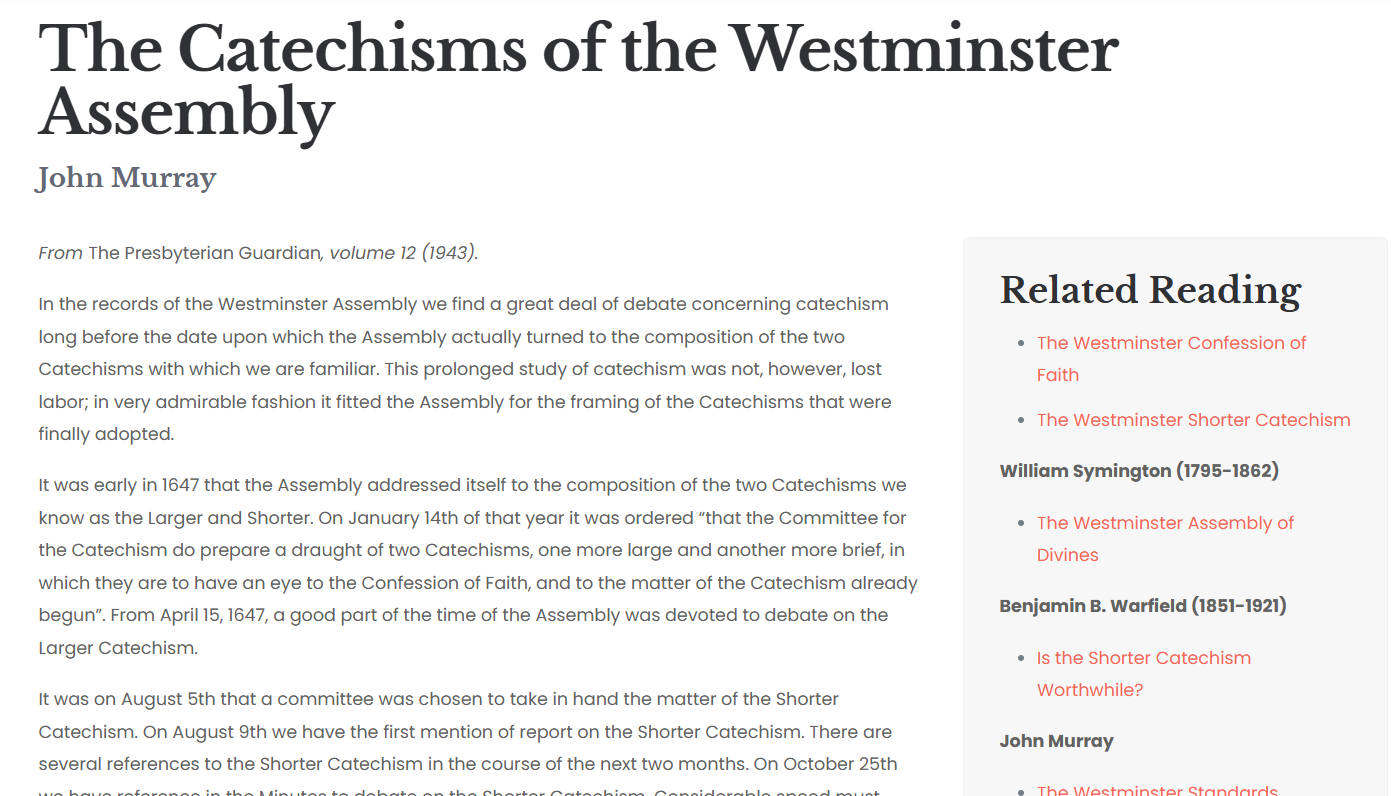
In the records of the Westminster Assembly we find a great deal of debate concerning catechism long before the date upon which the Assembly actually turned to the composition of the two Catechisms with which we are familiar. This prolonged study of catechism was not, however, lost labor; in very admirable fashion it fitted the Assembly for the framing of the Catechisms that were finally adopted.
It was early in 1647 that the Assembly addressed itself to the composition of the two Catechisms we know as the Larger and Shorter. On January 14th of that year it was ordered “that the Committee for the Catechism do prepare a draught of two Catechisms, one more large and another more brief, in which they are to have an eye to the Confession of Faith, and to the matter of the Catechism already begun”. From April 15, 1647, a good part of the time of the Assembly was devoted to debate on the Larger Catechism. ---
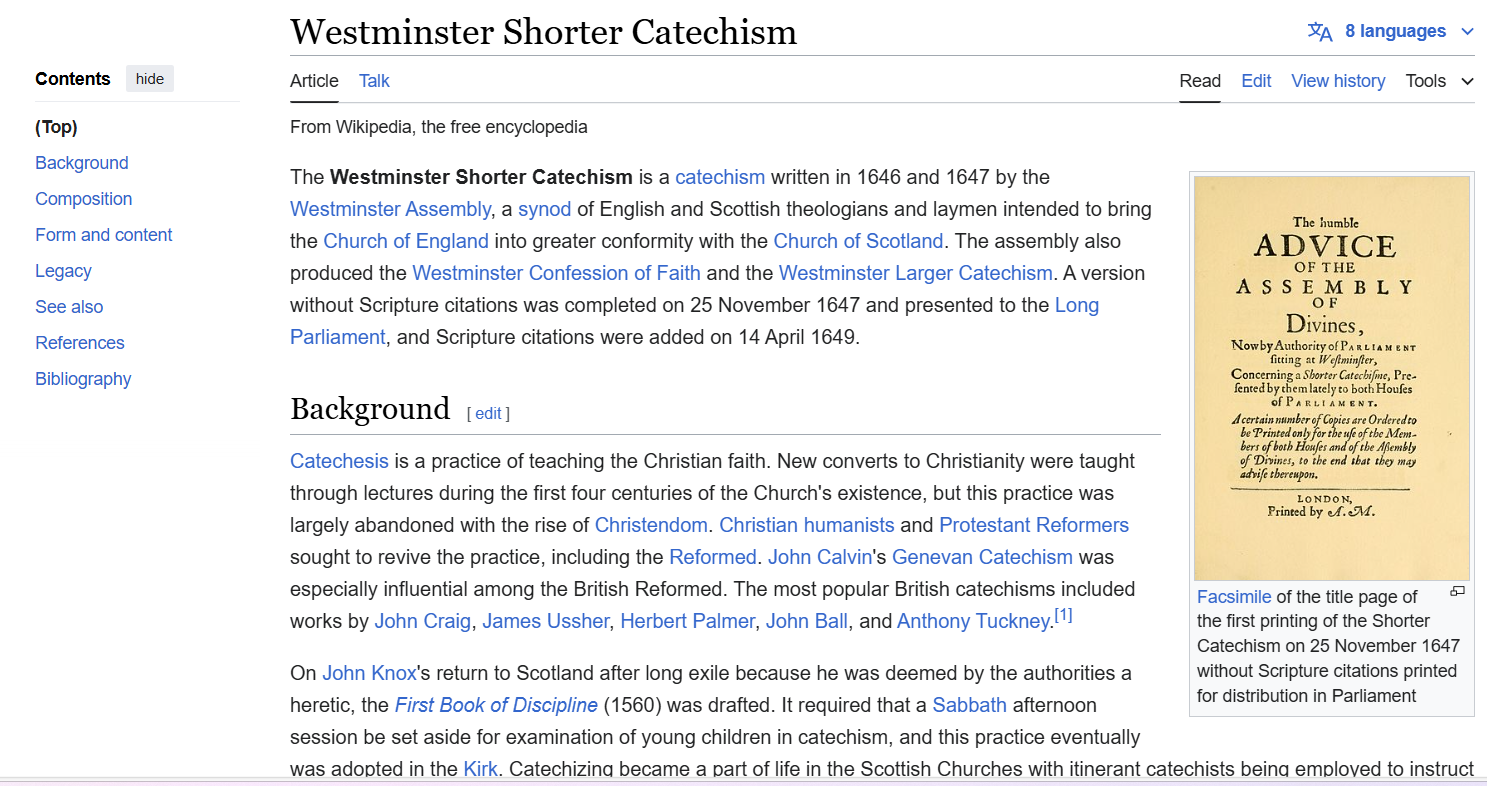
The Westminster Shorter Catechism is a catechism written in 1646 and 1647 by the Westminster Assembly, a synod of English and Scottish theologians and laymen intended to bring the Church of England into greater conformity with the Church of Scotland. The assembly also produced the Westminster Confession of Faith and the Westminster Larger Catechism. A version without Scripture citations was completed on 25 November 1647 and presented to the Long Parliament, and Scripture citations were added on 14 April 1649. ---
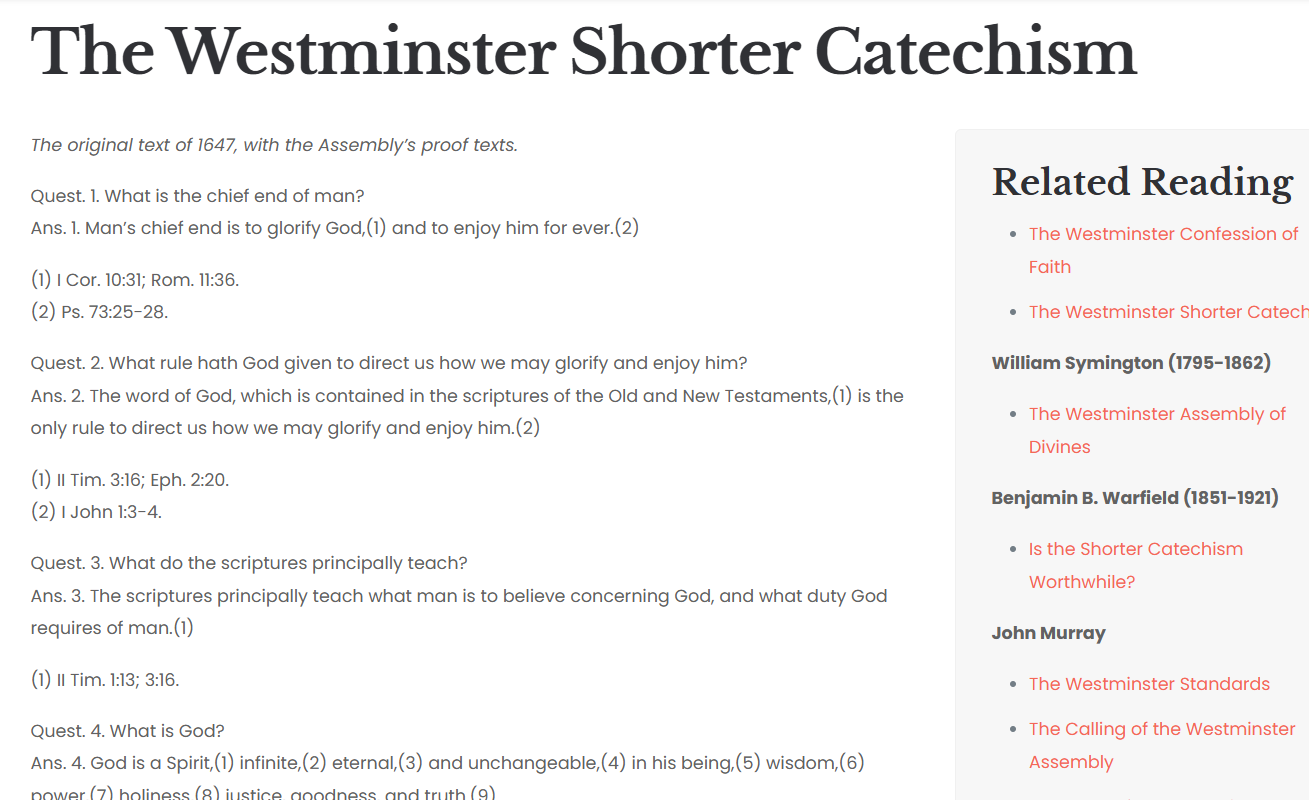
Quest. 1. What is the chief end of man?
Ans. 1. Man’s chief end is to glorify God,(1) and to enjoy him for ever.(2)
(1) I Cor. 10:31; Rom. 11:36.
(2) Ps. 73:25-28.
Quest. 2. What rule hath God given to direct us how we may glorify and enjoy him?
Ans. 2. The word of God, which is contained in the scriptures of the Old and New Testaments,(1) is
the only rule to direct us how we may glorify and enjoy him.(2)
(1) II Tim. 3:16; Eph. 2:20.
(2) I John 1:3-4.
Quest. 3. What do the scriptures principally teach?
Ans. 3. The scriptures principally teach what man is to believe concerning God, and what duty God requires of man.(1)
(1) II Tim. 1:13; 3:16.
continued
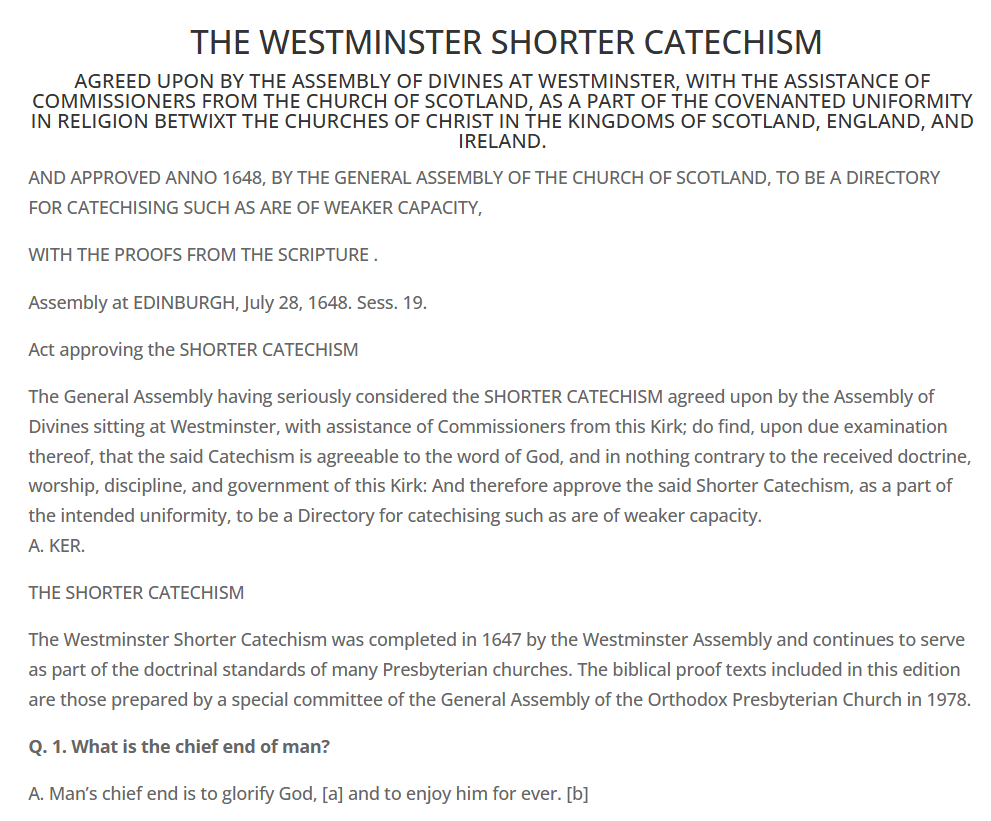
THE SHORTER CATECHISM
The Westminster Shorter Catechism was completed in 1647 by the Westminster Assembly and continues to serve as part of the doctrinal standards of many Presbyterian churches. The biblical proof texts included in this edition are those prepared by a special committee of the General Assembly of the Orthodox Presbyterian Church in 1978.
Q. 1. What is the chief end of man?
A. Man’s chief end is to glorify God, [a] and to enjoy him for ever. [b]
[a]. Ps. 86:9; Isa. 60:21; Rom. 11:36; 1 Cor. 6:20; 10:31; Rev.
4:11
[b]. Ps. 16:5-11; 144:15; Isa. 12:2; Luke 2:10; Phil. 4:4; Rev.
21:3-4
Q. 2. What rule hath God given to direct us how we may glorify and enjoy him?
A. The Word of God, which is contained in the Scriptures of the Old and New Testaments, [a] is the only rule to direct us how we may glorify and enjoy him. [b]
[a]. Matt. 19:4-5 with Gen. 2:24; Luke 24:27, 44; 1 Cor. 2:13;
14:37; 2 Pet.1:20-21; 3:2, 15-16
[b]. Deut. 4:2; Ps. 19:7-11; Isa. 8:20; John 15:11; 20:30-31;
Acts 17:11; 2 Tim. 3:15-17; 1 John 1:4
continued
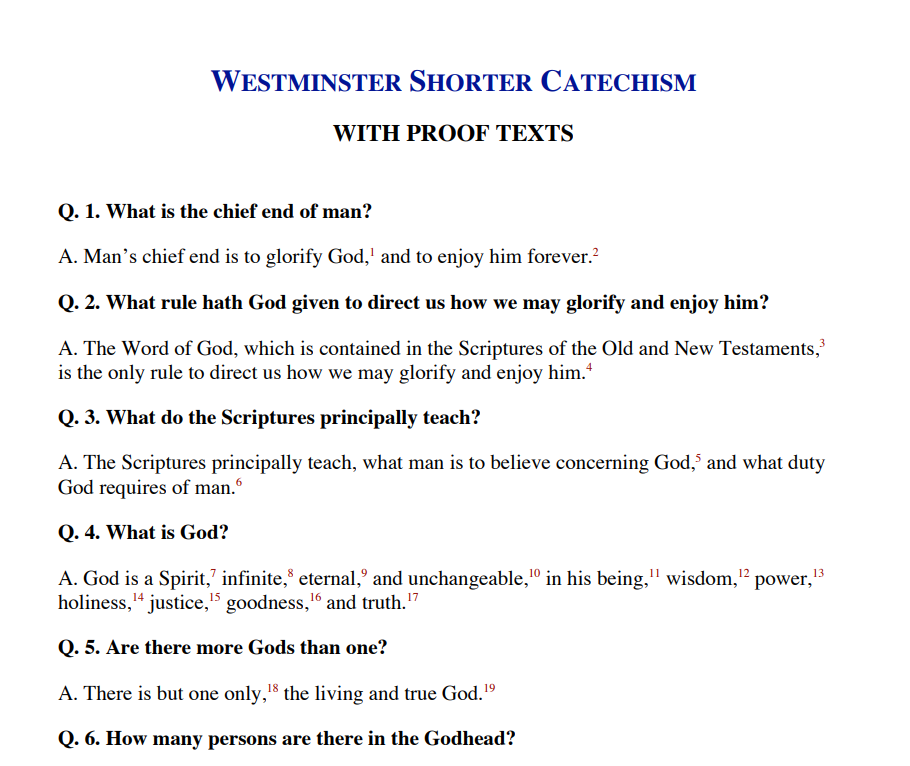
Q. 1. What is the chief end of man? A. Man’s chief end is to glorify God,1 and to enjoy him forever.2
Q. 2. What rule hath God given to direct us how we may glorify and enjoy him? A. The Word of God, which is contained in the Scriptures of the Old and New Testaments,3 is the only rule to direct us how we may glorify and enjoy him.4
Q. 3. What do the Scriptures principally teach? A. The Scriptures principally teach, what man is to believe concerning God,5 and what duty God requires of man.6
Q. 4. What is God? A. God is a Spirit,7 infinite,8 eternal,9 and unchangeable,10 in his being,11 wisdom,12 power,13 holiness,14 justice,15 goodness,16 and truth.17
Q. 5. Are there more Gods than one? A. There is but one only,18 the living and true God.19
continued
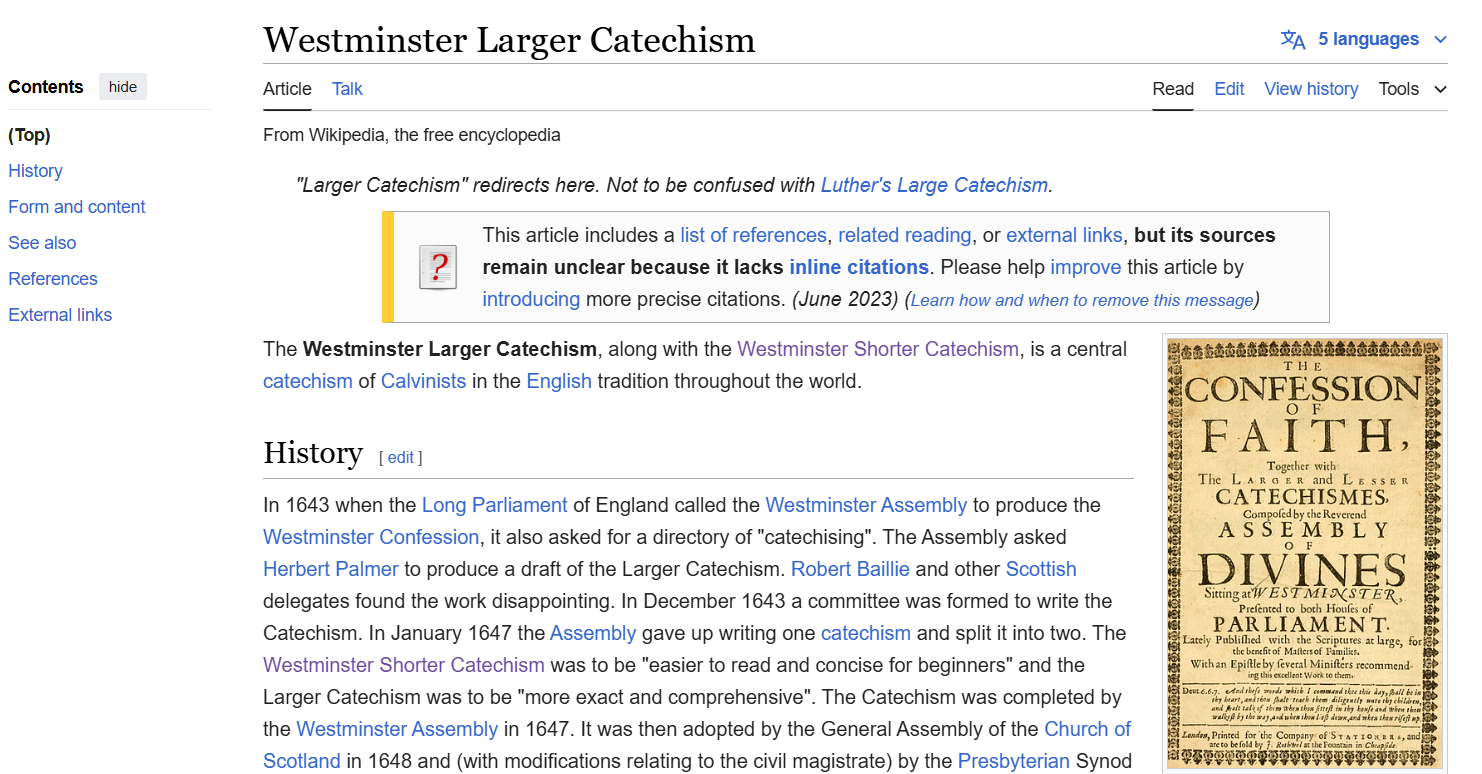
In 1643 when the Long Parliament of England called the Westminster Assembly to produce the Westminster Confession, it also asked for a directory of "catechising". The Assembly asked Herbert Palmer to produce a draft of the Larger Catechism. Robert Baillie and other Scottish delegates found the work disappointing. In December 1643 a committee was formed to write the Catechism. In January 1647 the Assembly gave up writing one catechism and split it into two. The Westminster Shorter Catechism was to be "easier to read and concise for beginners" and the Larger Catechism was to be "more exact and comprehensive". The Catechism was completed by the Westminster Assembly in 1647. It was then adopted by the General Assembly of the Church of Scotland in 1648 and (with modifications relating to the civil magistrate) by the Presbyterian Synod of New York and Philadelphia in 1788, and by the Presbyterian Church in the U.S.A., upon its formation the following year. In 1967, it was dropped by the United Presbyterian Church in the U.S.A. in the formulation of their Book of Confessions. However, it was embraced by the successor denominations such as the Presbyterian Church (U.S.A.) in that church's Book of Confessions as well as the more conservative successors, the Presbyterian Church in America (PCA), the Orthodox Presbyterian Church, the Evangelical Presbyterian Church, and the Bible Presbyterian Church. ---
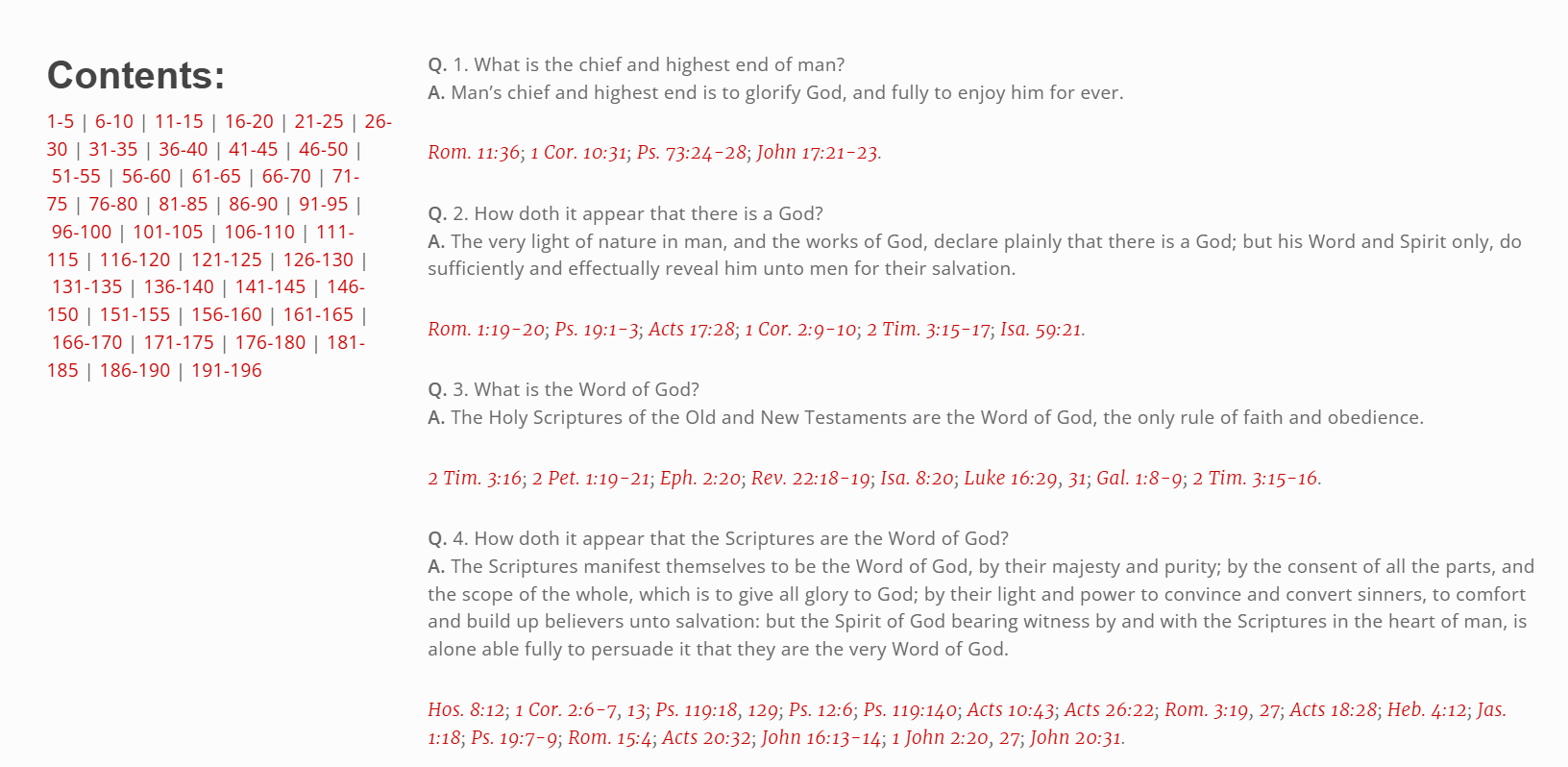
Q. 1. What is the chief and highest end of man?
A. Man’s chief and highest end is to glorify God, and fully to enjoy him for ever.
Rom. 11:36; 1 Cor. 10:31; Ps. 73:24-28; John 17:21-23.
Q. 2. How doth it appear that there is a God?
A. The very light of nature in man, and the works of God, declare plainly that there is a God; but his Word and Spirit only, do sufficiently and effectually reveal him unto
men for their salvation.
Rom. 1:19-20; Ps. 19:1-3; Acts 17:28; 1 Cor. 2:9-10; 2 Tim. 3:15-17; Isa. 59:21.
continued
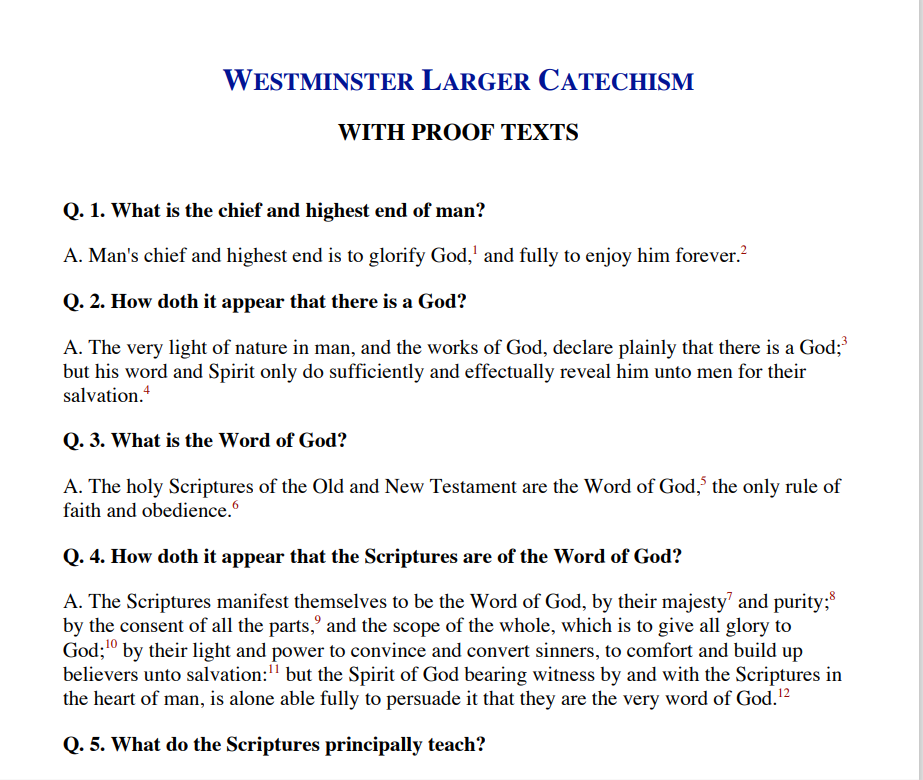
Assembly at EDINBURGH, July 2, 1648. Sess. 10. Act approving the LARGER CATECHISM. THE General Assembly having exactly examined and seriously considered the LARGER CATECHISM, agreed upon by the Assembly of Divines sitting at Westminister, with assistance of Commissioners from this Kirk, copies thereof being printed, and sent to Presbyteries, for the more exact trial thereof; and publick intimation being frequently made in this Assembly, that every one that had any doubts or objections upon it might put them in; do find, upon due examination thereof, That the said Catechism is agreeable to the word of God, and in nothing contrary to the received doctrine, worship, discipline, and government of this Kirk; a necessary part of the intended uniformity in religion, and a rich treasure for increasing knowledge among the people of God: and therefore the Assembly, as they bless the Lord that so excellent a Catechism is prepared, so they approve the same, as a part of uniformity; agreeing, for their part, that it be a common Catechism for the three kingdoms, and a Directory for catechising such as have made some proficiency in the knowledge of the grounds of religion.
Q. 1. What is the chief and highest end of man? A. Man's chief and highest end is to glorify God,1 and fully to enjoy him forever.2
Q. 2. How doth it appear that there is a God? A. The very light of nature in man, and the works of God, declare plainly that there is a God;3 but his word and Spirit only do sufficiently and effectually reveal him unto men for their salvation.4
Q. 3. What is the Word of God? A. The holy Scriptures of the Old and New Testament are the Word of God,5 the only rule of faith and obedience.6
Q. 4. How doth it appear that the Scriptures are of the Word of God? A. The Scriptures manifest themselves to be the Word of God, by their majesty7 and purity;8 by the consent of all the parts,9 and the scope of the whole, which is to give all glory to God;10 by their light and power to convince and convert sinners, to comfort and build up believers unto salvation:11 but the Spirit of God bearing witness by and with the Scriptures in the heart of man, is alone able fully to persuade it that they are the very word of God.1
continued
Q. 1. What is the chief and highest end of man? A. Man's chief and highest end is to glorify God, and fully to enjoy him for ever.
Q. 2. How doth it appear that there is a God? A. The very light of nature in man, and the works of God, declare plainly that there is a God; but his Word and Spirit only, do sufficiently and effectually reveal him unto men for their salvation.
Q. 3. What is the Word of God? A. The holy Scriptures of the Old and New Testament are the Word of God, the only rule of faith and obedience.
Q. 4. How doth it appear that the Scriptures are the Word of God? A. The Scriptures manifest themselves to be the Word of God, by their majesty and purity, by the consent of all the parts, and the scope of the whole, which is to give all glory to God; by their light and power to convince and convert sinners, to comfort and build up believers unto salvation; but the Spirit of God bearing witness by and with the Scriptures in the heart of man, is alone able to fully persuade it that they are the very Word of God.
Q. 5. What do the Scriptures principally teach? A. The Scriptures principally teach, what man is to believe concerning God, and what duty God requires of man
continued
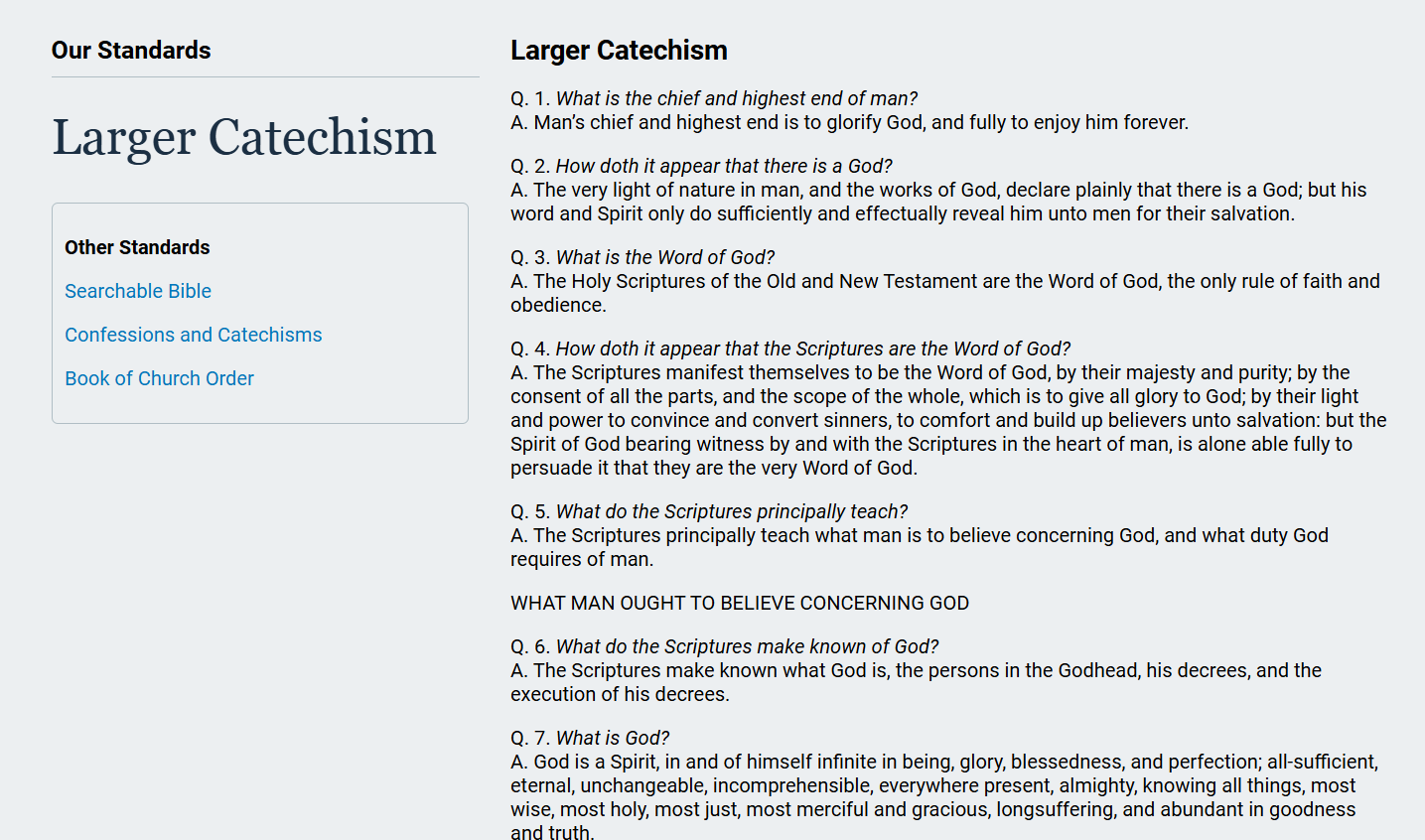
Q. 1. What is the chief and highest end of man?
A. Man's chief and highest end is to glorify God, and fully to enjoy him forever.
Q. 2. How doth it appear that there is a God?
A. The very light of nature in man, and the works of God, declare plainly that there is a God; but his word and Spirit only do sufficiently and effectually reveal him unto men for their salvation.
Q. 3. What is the Word of God?
A. The Holy Scriptures of the Old and New Testament are the Word of God, the only rule of faith and obedience.
Q. 4. How doth it appear that the Scriptures are the Word of God?
A. The Scriptures manifest themselves to be the Word of God, by their majesty and purity; by the consent of all the parts, and the scope of the whole, which is to give all glory to God; by their light and power
to convince and convert sinners, to comfort and build up believers unto salvation: but the Spirit of God bearing witness by and with the Scriptures in the heart of man, is alone able fully to persuade it that they are the
very Word of God.
Q. 5. What do the Scriptures principally teach?
A. The Scriptures principally teach what man is to believe concerning God, and what duty God requires of man.
continued